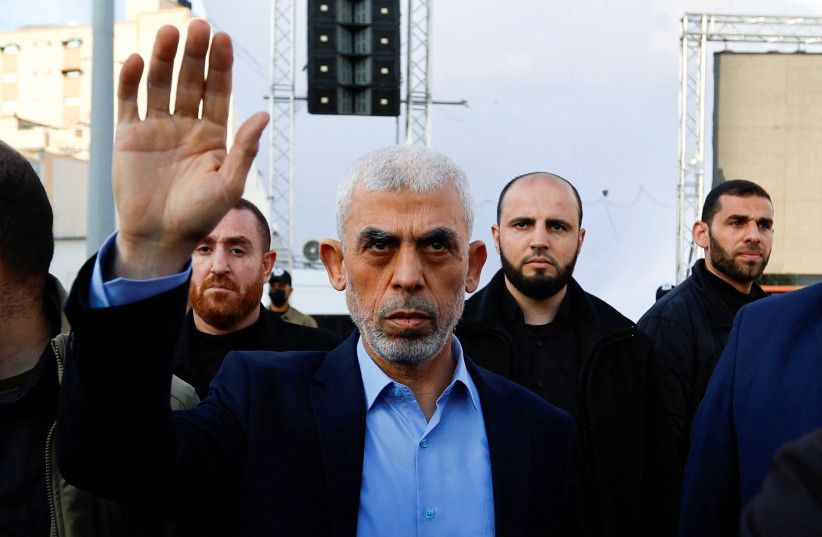Hamas escape: How Netanyahu had the chance to kill Yahya Sinwar six times
An operational plan to eliminate the leader of Hamas in Gaza, Yahya Sinwar, has been presented to Prime Minister Benjamin Netanyahu at least six times in recent years. This information has been gathered through conversations with numerous senior figures in the security establishment, both past and present.
This wasn’t merely a theoretical proposal but a well-thought-out and actionable plan that could be put into motion at any given moment. Notably, Sinwar, as mentioned, doesn’t spend most of his time in hiding; he maintains a visible presence and doesn’t move between secret apartments or bunkers, unlike Hezbollah leader Hassan Nasrallah, who has followed such practices since 2006.
From Netanyahu’s perspective, this information is of the utmost secrecy.

The plan to eliminate Sinwar was put forward to Netanyahu by the three most recent heads of the Shin Bet, each during their respective tenures: Yoram Cohen, Nadav Argaman, and the current head, Ronen Bar. This plan was highly detailed and included various contingency scenarios, making it capable of targeting any senior Hamas figure in Gaza, not just Sinwar. It resembled operations like Operation Orchard (an Israeli airstrike on a suspected nuclear reactor in Syria) or Operation Bramble (an Israeli plan to assassinate Iraqi President Saddam Hussein, in 1992) during the First Lebanon War.
Former Shin Bet head Cohen had previously revealed in the “Meet the Press” program that the Shin Bet had recommended conducting an “airlift” operation targeting all of Hamas’s leaders in Gaza. He even mentioned that he and his successors continued to propose this to senior government officials. The Shin Bet viewed Hamas as a terrorist organization that needed to be neutralized due to the significant threat posed by its agenda. However, as mentioned earlier, Netanyahu rejected all these operational opportunities.
In addition, in the past year, Hamas has increased the strength of its elite commando unit, the Nukhba, by 100%. This involved doubling the size of the commando force intended for infiltrations into Israel, which was accomplished within one year. Israel was aware of this development, but it did not trigger any immediate action.
Israel’s intelligence failures apparent
As time goes on, the scope of the intelligence and operational failure that preceded the Israeli crisis on October 7th and the horrific massacre that followed in the border region becomes increasingly apparent. Sinwar’s speech, in which he detailed his plan to overrun Israel like a “flood,” was the culmination of Hamas’ major exercise in May, during which the plan that was executed in October was openly practiced in front of Israel’s eyes. Troubling reports from the veteran surveillance and intelligence unit, Unit 8200, which closely monitored these events and sent a series of memos with alarming content to their superiors in September, went largely unheeded. In fact, some of those in charge ridiculed these reports, labeled them as fantasies, and dismissed their warnings.
Despite the aforementioned details, the attacks and online smear campaigns against the head of the Mossad and his senior officials, primarily led by supporters of Netanyahu, have significantly undermined their positions. The Mossad’s failure represents a severe strategic setback, but none of its top officials had foreseen such an outcome.
The current situation is hauntingly reminiscent of the 1973 failure, beginning with the clever deception operations by Egypt and Syria in ’73 and Sinwar’s actions this year. It all stems from overconfidence and arrogance in the planning process. Those accountable for this failure are fully aware of their responsibilities and have already faced consequences. Further attacks on them will only weaken the ongoing intelligence efforts.
Furthermore, it’s essential to emphasize that this won’t absolve Netanyahu of his responsibilities. His role extends into entirely different domains. Firstly, as the Prime Minister, he bears comprehensive responsibility for all matters related to security. He has reiterated this responsibility many times himself. Secondly, he is accountable for the policy that viewed Hamas as an asset rather than a liability. He brought in the Qataris, who injected hundreds of millions of dollars into Hamas after Mahmoud Abbas cut off the funding. He promised to eliminate the threat, but instead, he allowed it to grow and flourish.
In response to this column, former Defense Minister and leader of Yisrael Beiteinu, MK Avigdor Lieberman said: “I read that Netanyahu denied Ben Caspit’s report about avoiding at least six attempts to eliminate Sinwar. Netanyahu can continue to deny it as much as he wants. He’s the one who granted immunity to Yahya and the leaders of Hamas, preventing any attempts to neutralize them. I’m stating this not as mere speculation but as someone with personal knowledge of the matter.”





Comments are closed.